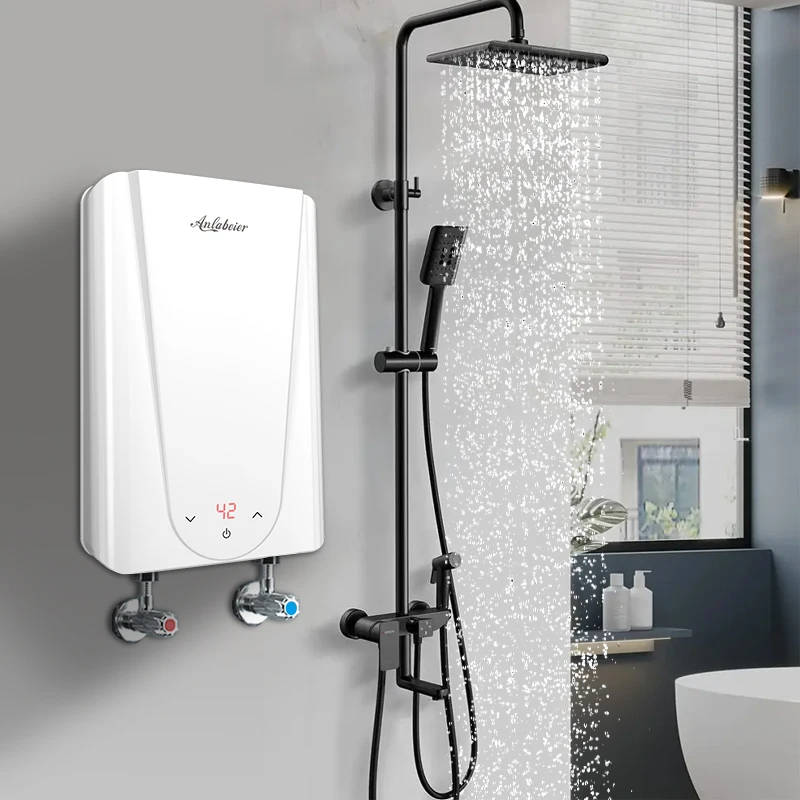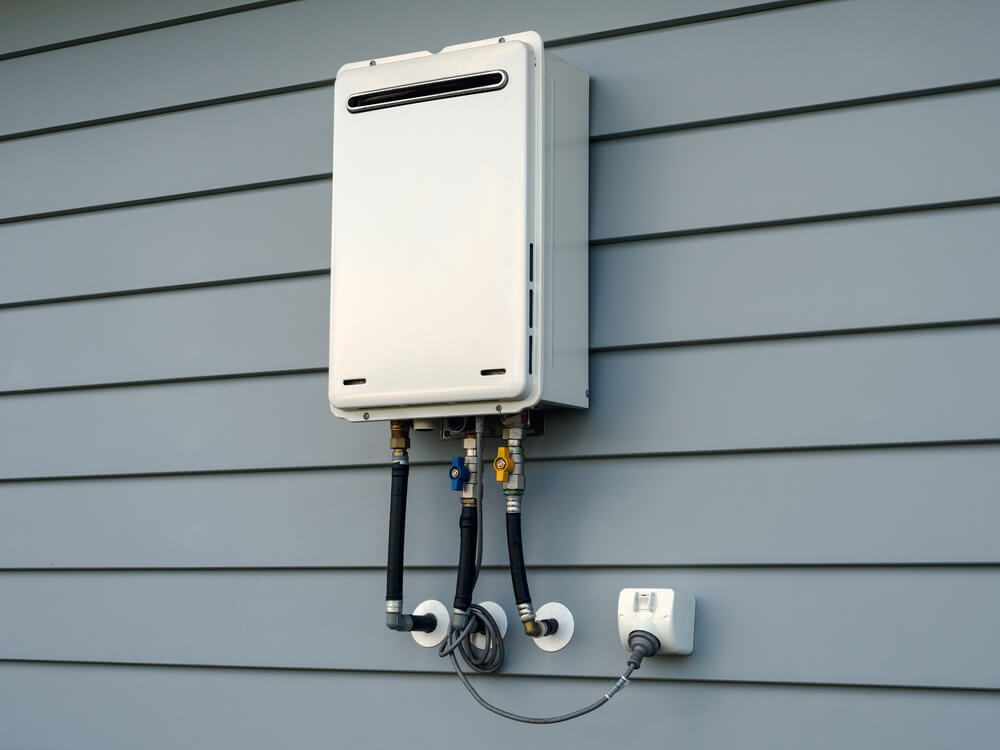How Tankless Water Heaters Grant Unmatched Benefits
How Tankless Water Heaters Grant Unmatched Benefits
Blog Article
Do you find yourself looking for know-how around Why You Should Consider a Tankless Water Heater?

In a world where ease and efficiency preponderate, it's not a surprise that home owners are constantly looking for smarter ways to handle their home's power consumption and convenience. One advancement that has actually progressively gained appeal is the tankless water heater. Yet exactly what makes these systems stand out from the traditional tank-based designs most of us matured with? Let's dive in and explore the advantages of tankless hot water heater, assisting you decide if it's time to make the switch in your house.
Introduction
Photo this: you step into the shower after a long day, expecting a comforting cascade of hot water, only to be greeted by icy droplets because the last individual used all of it up. Sound acquainted? Traditional hot water heater store a fixed quantity of warm water, indicating you're at the mercy of that container's supply. Tankless systems, on the other hand, heat water as needed. No more going out mid-shower, no more wrestling with routines just to guarantee warm water is offered.
Recognizing Tankless Hot Water Heater
What Are Tankless Hot Water Heater?
Tankless hot water heater, occasionally called on-demand or immediate hot water heater, offer warm water just as it's required. As opposed to saving gallons of pre-heated water, these systems kick right into activity the minute you activate the faucet. Water goes through a warmth exchanger, heating up in real-time, meaning you get a nonstop circulation of hot water without the requirement for a big storage tank resting lazily by.
How Do They Vary from Traditional Equipments?
Typical heating units hold a reservoir of warm water, using power to maintain that storage tank at a constant temperature level. Tankless devices eliminate the standing supply, cutting down on squandered energy and the cumbersome impact of a large cyndrical tube. Essentially, you're updating from a "stockpile" frame of mind to a "made-to-order" approach.
Usual Types of Tankless Units
Tankless water heaters generally are available in 2 selections: gas and electric. Gas designs tend to deliver greater circulation rates, ideal for bigger households, while electric designs frequently offer smaller homes and are normally less complicated to mount. Furthermore, some systems are made for point-of-use (offering one fixture) while others can take care of the entire home's hot water needs.
Key Advantages of Tankless Water Heaters
Power Performance and Cost Financial Savings
Say goodbye to heating up a giant container's well worth of water and keeping it toasty all day. Tankless heaters reduce standby energy losses, which can decrease utility costs. While the preliminary expense might be higher, the lasting cost savings often justify the investment.
3. Space-Saving Style
If your home is short on storage, removing the large container liberates valuable area. Tankless devices are portable and can commonly be mounted on wall surfaces, tucked away in edges, or mounted in limited utility wardrobes without having all to oneself the whole space.
4. Longer Life-span
A properly maintained tankless hot water heater can outlive its tank-based relative. Traditional tanks might last 10-15 years, while tankless models can maintain chugging along for 20 years or more, making them a solid financial investment in time.
1. Countless Warm Water Supply
Ever before needed to set up showers so every person gets their fair share of hot water? With tankless, that becomes a thing of the past. As long as the heating unit's circulation capacity isn't gone beyond, you can take back-to-back showers without developing into a popsicle.
5. Improved Water High Quality
Storing water in a tank can in some cases result in sediment buildup or a somewhat "off" taste. With tankless systems, fresh water is warmed on the spot, decreasing the possibilities of debris buildup and possibly offering cleaner-tasting water.
Considerations Prior To Changing
Though the benefits are engaging, it's a good idea to consider a few factors prior to totally dedicating.
Reviewing Your Home's Water Usage Patterns
If your family all at once utilizes numerous fixtures with high warm water demand, make certain the unit's flow rate satisfies your demands. Understanding your usage patterns helps you select the right dimension and kind of tankless heating unit.
Upkeep and Care Tips
Tankless systems are fairly low upkeep, however they aren't set-it-and-forget-it appliances.
Regular Cleansing and Descaling
Tough water minerals can develop in the warm exchanger, affecting effectiveness. Normal descaling (frequently suggested annually) maintains the unit running at peak performance.
Annual Specialist Examinations
A yearly checkup from an expert guarantees minor problems are caught early. They'll examine the unit's efficiency, seek leakages, and help preserve optimal performance.
Preliminary Investment Costs
Tankless heating systems usually include a higher in advance cost. Between the device itself and potential setup modifications, the initial expense may give you sticker shock. Yet remember to watch it as a long-term investment.
Installment Needs
Relying on your home's framework, you might need added electrical ability or gas line upgrades. Guarantee you recognize the installment needs and talk to an expert to prevent shocks.
Making Sure Correct Ventilation
For gas designs, appropriate ventilation is essential to safely get rid of exhaust gases. Ensure venting systems are clean and properly set up to prevent any type of possible security hazards.
Comparing Different Brands and Models
Not all tankless hot water heater are developed equal.
Investigating Reliable Makers
Search for credible brand names with a background of generating high quality devices. A trusted maker usually gives much better client assistance and longer warranties.
Setup: DIY or Professional?
While some home owners delight in tackling jobs themselves, tankless installment could not be the best time to break out the toolbox.
Pros and Cons of Do It Yourself Setup
A do it yourself install could conserve cash, yet it comes with dangers. Wrong installation can bring about ineffectiveness or safety worries. If you come in handy and have experience, it may be possible-- but proceed with care.
Checking Out Reviews and User Comments
Individual evaluations and feedback from neighbors or close friends who have actually gone tankless can supply beneficial insights. Occasionally, real-life experiences can be much more informing than marketing pamphlets.
When to Call an Expert Plumbing Professional
For the majority of, calling a professional ensures everything's done properly. An expert plumbing technician comprehends regional codes, sizing requirements, and venting criteria, minimizing the threat of incidents.
Making the most of Efficiency
You have actually purchased a tankless unit-- now maximize its performance.
Optimal Temperature Level Setups
Most people establish their devices in between 120-140 F. Changing the temperature level can enhance comfort and cost savings. Experiment to locate a wonderful spot that doesn't throw away power.
Pairing with Low-Flow Fixtures
Wish to extend your device's abilities? Consider installing low-flow showerheads and faucets. They lower water usage, permitting your tankless system to supply a stable stream of hot water without straining.
Environmental Effect
Tankless hot water heater line up with greener living objectives.
Minimized Carbon Footprint
By utilizing much less energy and only heating water as needed, tankless systems can lower your home's carbon footprint, reducing your environmental influence.
Conserving Natural Resources
Much less power usage and less wasted warm water convert right into less natural resources being utilized, an ecological win-win.
That Profits A Lot Of from Tankless Heating units?
The beauty of tankless heaters is that they can suit a selection of families.
Big Households vs. Single Occupants
Big families may love the endless warm water supply, while solitary occupants value the power financial savings from not heating up a whole container for just someone's morning shower.
Homeowners with Minimal Space
If your home is short on square video, losing the large tank liberates area for other essentials-- or possibly just more breathing space.
Eco-Conscious Consumers
Going tankless aligns with environmentally friendly values, ensuring you're not throwing away power or sources.
Future Patterns in Tankless Water Heaters
The world of home devices is ever-evolving, and tankless water heaters are no exception.
Developments in Modern technology
R&D is continuously enhancing heat exchangers, making units a lot more reliable and resilient. Future models might be also quieter, a lot more small, and much better matched for differing climates.
Smart Home Combination
Think of adjusting your hot water heater's temperature level through an application or getting upkeep informs on your phone. As smart home tech advances, we'll see more connectivity and comfort.
Final thought
Picking a tankless water heater is more than simply updating your home's warm water system; it's purchasing long-term convenience, power effectiveness, and a greener lifestyle. By considering your household's water usage, being mindful of installation requirements, and committing to regular upkeep, you can take pleasure in a constant stream of warm water without the baggage of a bulky container. As modern technology progresses, you can anticipate also smarter, much more reliable tankless solutions that not only make your life easier however additionally benefit the earth.
Why You Should Consider a Tankless Water Heater for Your Home
Energy Efficiency and Cost Savings
Tankless water heaters, also known as on-demand water heaters, heat water only when needed. This means they don't waste energy keeping a tank of water hot constantly. This efficiency translates into substantial cost savings on your monthly energy bills.
Endless Hot Water Supply
One of the significant advantages of tankless water heaters is their ability to provide a continuous supply of hot water. Traditional tank water heaters have a limited capacity and can run out of hot water, especially during peak usage times. In contrast, tankless water heaters can provide an endless stream of hot water, making them ideal for larger families or homes with high water usage.
Space-Saving Design
Tankless water heaters are compact and take up significantly less space compared to traditional tank heaters. They can be installed on walls, under cabinets, or even outside, freeing up valuable space in your home. This makes tankless water heaters a great option for smaller homes or properties with limited space for a traditional water heater.
Longer Lifespan and Lower Maintenance
Tankless water heaters typically have a longer lifespan compared to traditional tank heaters. They can last up to 20 years or more with proper maintenance. Additionally, tankless systems are designed with replaceable parts, which can extend their lifespan further and reduce long-term maintenance costs.
Environmentally Friendly
Reducing energy consumption not only saves you money but also benefits the environment. Tankless water heaters contribute to a smaller carbon footprint by using less energy to heat water. Their energy efficiency and ability to minimize standby heat loss make them an eco-friendly choice for environmentally conscious homeowners.
Customized Temperature Control
Tankless water heaters offer precise temperature control, allowing you to set the desired temperature to meet your specific needs. This level of customization ensures you always have water at the perfect temperature for your comfort and usage requirements.
https://beantownservices.com/blog/consider-tankless-water-heater-for-your-home

I discovered that article on Six Benefits of a Tankless Hot Water Heater while browsing on the search engines. Do you know about another individual who is fascinated about the subject? Be sure share it. I recognize the value of reading our article about Pros and Cons of Tankless Water Heater.
Book Report this page